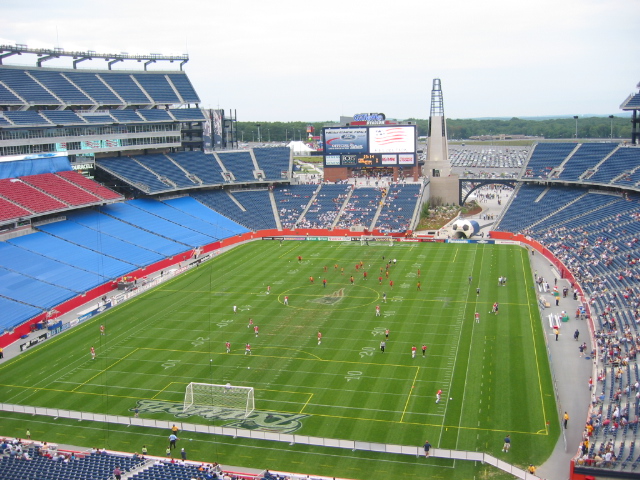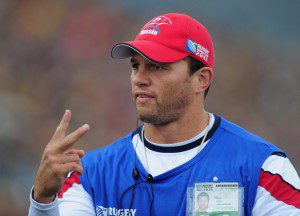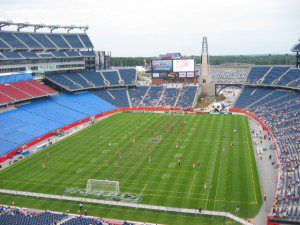

BOSTON, MA – RugbyLaw International, a company based out of Minnesota, caused quite a stir a few months ago when they announced hugely ambitious plans for a match between an “American Barbarians” side made up of converted NCAA football players and the Aviva Premiership’s London Irish. The Guardian, a UK newspaper that was complicit in the company’s attempts to drum up support for a nonexistent league, reported that there was to be a “combine” on June 15 to find players suited to the new football code. Then, after two months of creating one of “the most coached sides in history” (RugbyLaw founder Mac Robertson’s words from an interview with ThisIsAmericanRugby.com) the match would take place, with a return fixture in London planned for late August. Before they were more than words on a page, the plans began to fall apart.
Robertson’s initial attendance projections were an absurdity. Based on the dream that the Irish community in Boston would come together to watch a team because they were called the “London Irish” he hoped to have 30,000 attendees. Even had he fulfilled this projection (the US-Ireland match in Houston in June recorded the highest attendance for a rugby match in United States history, with almost 10,000 fewer spectators) his plans for a new professional league were, and are, doomed to fail. A key component of the new league calls for its teams to play in National Football League stadiums. According to Robertson, the MLS model of small, sport-specific stadiums is not the goal. However, the MLS as currently constituted should be exactly the model that American rugby eventually uses. One needs only look at the initial failures of the MLS to see the under RugbyLaw, American rugby is potentially headed down a similar, disastrous path.
The MLS launched in 1996 to great fanfare, and great attendance. Following the hugely successful 1994 World Cup, and with a new generation of “soccer moms” and their children who played the sport, it seemed as though the time was ripe for another try at a more sustainable professional league (the NASL’s implosion had assumed a deservedly legendary status by the 90’s). However, the league, also caught up in over-optimistic projections of consumer enthusiasm agreed to ground-share agreements with NFL sides, anticipating large crowds. While a match between the Los Angeles Galaxy and New York/New Jersey MetroStars drew almost 70,000 fans in April of 1996, the average match attendance for the league’s first year was 17,406. The smallest stadium in the league was San Jose’s Spartan Stadium, with a capacity of 30,456. Other cavernous venues included the Cotton Bowl, (92,100) the Rose Bowl, (92,542) Arrowhead Stadium (81,425) and Giants Stadium (80,200). The MLS, though its numeric attendance figures were respectable in a vacuum, quickly began foundering, as matches were played before stadiums that were less than 20 percent full, creating a non-existent match day atmosphere. On a related note, over the first five years of league history, the MLS lost almost 350 million dollars.

Things began to turn around in the early 2000’s, coinciding with the construction of “soccer-specific” stadiums. Commissioner Don Garber began to make a concerted effort to create a match day atmosphere that was enjoyable for all fans who attended, and build ties with local communities. Today, his efforts are most visible in cities such as Seattle and Portland, where the local MLS teams have become top attractions, selling out virtually all their home matches. Though the Seattle Sounders now play at Qwest Field, home of the NFL’s Seattle Seahawks, they sold 22,000 season seats before beginning play, assuring that there would be no repeat of the funeral atmospheric disaster of the league’s early years. The MLS proved that a league must walk before it can run, and they corrected course with a philosophical overhaul that has the league in better financial shape than ever before. More importantly, American awareness of soccer is increasing, creating a symbiotic relationship between the league and its supporters that will keep the organization healthy for many years.
RugbyLaw would attempt to surpass all of those steps and tread the dangerous road of the MLS’ early years, without the financial backing to support its play. Nobody denies that a professional rugby league would be a huge step forward for the American rugby community, and many supporters of the sport are rightly ravenous for such an offering. However, this desire cannot and should not blind people to the realities of RugbyLaw’s offering. Repeatedly, Robertson has shown contempt for the existing community, stating in an interview on thisisamericanrugby.com “if we want to damn ourselves to a slower developmental path then we should be trying to use existing U.S. ruggers, but if we want to be major league in terms of our ability of offering games on the international stage and using international resources, i.e. players, then we can’t afford to go down that developmental route.”
Robertson’s disdain for development shows exactly why he is a completely unfit steward for American rugby. A failed professional venture would set the sport back years in terms of national exposure. At a time when rugby is more popular than ever in the States, the last thing that the community needs is an arrogant, self-described “entrepreneur” who has repeatedly demonstrated a lack of even basic understanding of the sport’s precepts, traditions, and complexity. His assertion that football players can easily be converted to elite, international quality rugby superstars is misguided and lacking in evidence. Though a limited number of American football players have had success when converting codes there is little track record to suggest that his “combine” would produce such a result. American rugby fans deserve better than RugbyLaw, and though it appears as though the company will mercifully fade into trivia, it is worth remembering that when a league is founded, it must set its foundations on a solid base of infrastructure and knowledge.
Feel free to comment below.

